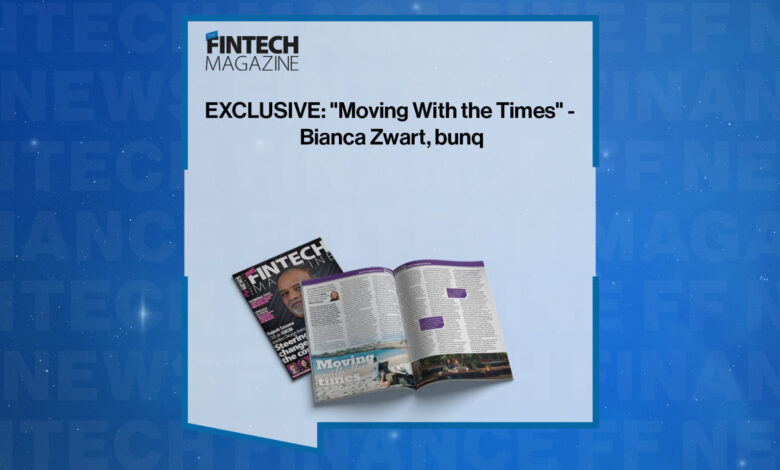EXCLUSIVE: “Moving With the Times”

One billion digital nomads are predicted to be roaming the world by 2035. European mobile bank bunq aims to go with them, says Chief of Staff Bianca Zwart
There’s a handy feature on the bunq mobile banking app that allows users to review and share experiences that they’ve paid for on their card.
Want a great café in Zagreb where you can drink coffee for hours over a laptop without getting the hard stare from staff? Or perhaps a fab shabby-chic pension in West Berlin that rocks Weimar-era style at pre-War prices.
They’re the kind of crowd-sourced recommendations on which the world’s new generation of worker-travellers thrive. Liberated from conventional employment routines, they’re highly mobile, constantly updating, digitally well-equipped – and creating a demand for services fashioned in their own image. Products like bunq, the ’bank of the free’.
Founded in 2012 in the Netherlands, in 2023 it became the first neobank in Europe to turn an annual profit (€53million), driven by a huge surge in customer demand over the previous 12 months. More than 12.5 million users are now logged on.
“We’ve seen a shift in people working remotely and living internationally. Home, work, travel are all just nicely blending in,” says the bank’s chief of staff Bianca Zwart.
According to Statista, more than 35 million people – roughly half of them millennials (28-43 years old) – had already placed themselves in the digital nomad employment category in 2022.
That’s likely a ludicrously conservative figure now, given the proliferation of visas made available over the past 12 months by countries chasing the ‘nomadic dollar‘ or, in some cases, just an injection of youth into an ageing demographic.
And it’s not just the ‘pull’ but the ‘push’ driving what Harvard Business Review terms these ‘fluid’ as opposed to ‘solid’ lifestyles – ones noticeably not rooted in one place or one concept of community. In the UK, for example, more than seven in 10 people in a Post Office survey of 2,000 UK employees said they didn’t just like the thought of travelling while working remotely, but were also actively planning to do it.
Perhaps that’s partly due to the fact that, in the current cost-of-living squeeze, a UK salary goes a lot further abroad. As one nomad puts it: “Honestly, if I’m going to struggle, I’d rather struggle in the sun.”
And employers have responded. Notwithstanding some backsliding by well-known companies in the US, a recent Gallup survey showed that eight in 10 remote-capable employees there expect to work hybrid or fully remote this year. And a Gartner survey of bosses in 2022/3 showed 82 per cent plan on incorporating more remote work and digital nomad-adjacent policies for their employees in the future.
But these seismic shifts in lifestyle haven’t, by and large, been ones that legacy financial institutions have kept up with. And, in Zwart’s opinion, that comes down to the wrong strategic priorities being baked into their organisations, as much as a technology timelag.
“A lot of sectors have already been playing to these needs. We believe that something as vital as your finances – the banking sector – cannot stay behind,” she says.
So how has Bunq’s approach as a bank been different?
“It’s a fundamental shift, focussing on the user, rather than focussing on what serves the bank”
“In the beginning, instead of chasing vanity metrics, we put a lot love and effort into creating something of value,” says Zwart. “We had a very simple conviction: if we built a product that people truly love to use, they’ll be willing to pay a couple of euros for it. User-centricity is in our DNA; you can feel it in the product.
“When I use the app, it feels as though it’s tailored for me. That’s a fundamental shift, focussing on the user, rather than focussing on what serves the bank.”
It was important that unity of purpose was reflected across the whole organisation from the start, she adds – and Zwart speaks as one who was recruited the year of bunq’s launch as a junior member of staff, working her way up, before leaving to do the hard yards as an entrepreneur, and returning in 2022 to become second-in-command to founder Ali Niknam.
“The company structure completely mirrors the user journey,“ she says. “We don’t create roles for the sake of creating roles. Rather, we look at ownerships, as we call them – validated problems that our users have. Someone creates an ownership and truly focusses on that.
“Secondly, any proposal within the bank starts with the most important question: what is in it for our user? If you cannot answer that question, we’re not going to do it. And, last but not least, we work with great, ambitious people who just truly want to get things done and make the experience better every day. We really make sure that our commercial reality is in line with our user happiness.“
bunq inhabits similar territory to N26, Tomorrow, Monzo and Revolut in Europe. But, unlike them, it waited significantly longer to seek external funding, Niknam instead choosing to bootstrap its expansion until 2021 when it set the record for the largest Series A funding round for a European fintech at €193million.
That injection of cash by Pollen Street Capital was used partly to buy an app for splitting expenses, Tricount and the Irish business lender Capitalflow, partly to invest in Al-driven customer service and, having expanded to 30 European countries, it also gave bunq the resources to look at re-entering the UK after Brexit and establish operations in the US. For a bank focussed on serving not just the financial but the lifestyle needs of the digitally nomadic, America is a key market. Americans make up over half of all workers who assign to the label, while the US is one of the top three destinations worldwide for nomads, alongside Spain and Thailand.
“We want to focus on this very specific group that I think suits our proposition well,“ says Zwart. “People that have ties to both Europe and the United States, so people on both sides of the Atlantic, who want to have accounts in USD and Euros, and to seamlessly transfer between the two. Our product is amazing for that.“
The UK product launch, meanwhile, will be something of a re-run for bunq, which was operating there up until Brexit. In its absence, of course, the banking landscape has changed somewhat. German neobank N26 left, but Revolut (also now in profit, but still without a UK banking
licence) has expanded. Fully UK-licensed Monzo now regularly makes the charts as a bank for digital nomads, working both inside and outside of Britain.
Work culture has altered, too, over the past four years. Many more millennials and Gen Z-ers have entered the workforce – the generations who were most enthusiastic about changing location, according to that Post Office survey – while a third of UK companies now claim they allow employees to log on from different countries.
“We love the UK market and our product is a great fit for it,” says Zwart. “And that’s not based on assumptions… we saw that when UK customers were able to use it before, because it basically gives them the ability to bank like a local.
“Home, work, travel are all just nicely blending in”
“London is a digital nomad hub – not just the people travelling there, but also for people from the UK who travel abroad a lot. Spain is one of the hot spots for them and we can offer them that pan-European experience – and not just in currencies.
“For example, if you need to pay your landlord in Spain there are not many people who will accept a non-Spanish bank account. We offer just that. You can open a Spanish IBAN as soon as you land in Spain, so you have everything set up and you can truly live like a local.”
As the Harvard Business Review observed, the image and reality of a nomadic lifestyle are often very different.
“Unrooted living requires effort, including finding short-term housing, work, health care, financial services, and education for nomadic families,“ it says, adding, “These are also market opportunities.“
And that’s what bunq has seized on. The bank is all about making life – not just money management – easy for users. It was one of the first to completely open up its API ‘because it adds more value to the user, so why wouldn’t we?’ says Zwart. And, like its user base, its horizon is endless.
Back in 2015, Pieter Levels, another Dutch entrepreneur and founder of the NomadList – a subscription-based online community, used by millions of nomads and would-be nomads every month, with 35,000 paying members – predicted that by 2035 there will be one billion digital nomads. They will all be looking for services tuned to their needs.
“We’re already on our way to becoming a global neobank,“ says Zwart. “Next is looking at how we can make our users’ lives even easier, maybe beyond banking by doing great partnerships and integrating into services that our users already use.“
This article was published in The Fintech Magazine Issue 32, Page 17-18



